by Ronen Bergman
Hat tip: Dr. Carolyn Tal
'Obama ordered to stop spying against friendly heads of state, but to continue spying on Netanyahu. We all understood what that meant,' he says.
BERLIN - We met on Wednesday in a cafe in Berlin, near the Brandenburg Gate, where preparations were underway for the fireworks display on New Year's Eve. I can't reveal his real name, so in this story I will call him "Robert." He's a former senior official in the American intelligence community, and during his service he was exposed to highly classified material concerning Israel – the kind that originated from the deep intelligence cooperation between the intelligence agencies of both countries, and the kind that the United States obtained without Israel's knowledge by using advanced spying measures.
I've known Robert for a few years, since he retired from his job, and have interviewed him for a new book on the history of the Mossad. In several of our meetings he hinted that the United States knows much more about Israel than we think it does, but refused to elaborate further. In our meeting this week, he finally agreed to get into the details.
"Throughout the years we've been wondering about what we perceived to be a kind of Israeli naiveté, or a certain kind of complacency, when discussing highly classified secrets on encrypted communication systems," Robert says. "After all, the ISNU (Israeli Sigint National Unit, the nickname given to IDF Intelligence Unit 8200 by the American intelligence community - RB) managed to break so many measures considered safe by your enemies, that you should know that anything could be decrypted. You're a lot more vulnerable and transparent than you think."
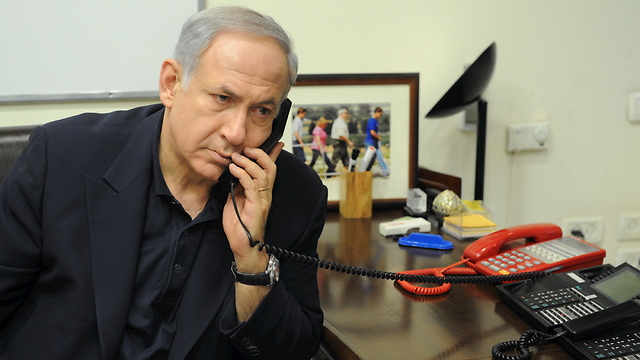
Prime Minister Netanyahu has a 'Red Phone' in his office (Photo: Moshe Milner, GPO)
Several hours before our meeting, which was originally scheduled to discuss another issue, the Wall Street Journal published an investigative report about American spying against Israel, and mostly against Prime Minister Benjamin Netanyahu and his top aides. The report describes the American spying capabilities as much deeper and more comprehensive than Israel knew, including the ability to operate eavesdropping devices or interception (it is unclear whether a physical device or sophisticated computer spyware were used) inside the internal communications system that the prime minister also uses.
Following the report's publication, Robert agreed to broach the subject. The reason for that, beyond the fact that the information he had kept from me until that point had now been revealed by the newspaper, was his desire to warn against the disastrous consequences of the strained relationship between the leaders of the two nations. "In the United States, the mindset coming from the Commander in Chief projects onto the soldiers, down to the most junior among them. Obama despises Netanyahu, and that affects the entire system," Robert, who cares much about Israel, says with pain.
According to him, "After the Snowden affair (the revelation that the NSA eavesdropped on Western leaders - RB), President Obama ordered to stop spying on leaders that the United States views as close and friendly allies (Robert gestures at the Chancellery building by the river). But he ordered to continue, all the more forcefully, spying on several leaders, primarily Netanyahu. We all understood what that order meant: Obama doesn't view Netanyahu as a friendly leader."
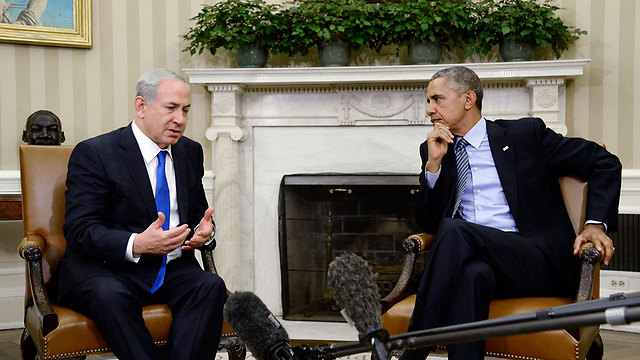
Obama, right, does not view Netanyahu, left, as a friendly leader (Photo: EPA)
Netanyahu, it's important to note, did not wait for the report in the American media. Over the past few years he has been repeatedly telling his aides that the US is making great efforts to spy on him. He even instructed information security personnel at the Shin Bet (Israel's General Security Agency – RB) and the Director of Security of the Defense Ministry (MALMAB) to take measures that, at times, were perceived as extreme, to the point of paranoia.
For example, Netanyahu ordered to get rid of the signs declaring on a parking spot reserved to the prime minister at any outdoors location he arrives at (for example, a classified military drill), claiming that American satellites could read the signs, telling Washington something important was happening there. He also ordered during classified meetings not only that cellular phones be switched off and electricity devices be unplugged (like televisions), but also that all data networks in the building be taken offline. These measures might have been too extreme, but at least based on what Robert says, Netanyahu's suspicions were justified - the Americans are making huge efforts to spy on him "a lot more than against any other Israeli leader ever."
"A big part of the efforts during Netanyahu's first years in office were dedicated to two things: The illegal settlements in the territories, and the preparations for a possible Israeli strike on Iran," Robert explains. Later on the Americans realized most of the information about the settlements can be obtained from public sources.
By the end of 2012, he says, American intelligence officials reached the conclusion that the threat of an Israeli strike against Iran had been lifted, at least temporarily. However, shortly thereafter, in early 2013, the US entered secret talks with Iran, and American intelligence significantly increased its efforts to discover what Israel knew of these negotiations. The United States hid the fact that the talks in Muscat, Oman were talking place, and when the Mossad caught wind of the talks and told Netanyahu about them, he responded with anger.
Later, when the public talks between world powers and Iran began, Netanyahu, who thought the deal being discussed was "a very bad deal," launched a massive campaign in an attempt to thwart the agreement.
"The CIA and the NSA received commanders' orders (meaning from Obama - RB) to view Netanyahu's aggressive measures against the diplomatic dialogue with Iran as a threat on vital national security interests of the United States, and act accordingly," Robert says. "This is an extreme situation, difficult, unprecedented in the relationship between the two countries, the kind of which I can't remember since I was a young intelligence agent during the (June 1982) Israeli invasion of Lebanon and the heightened hostility between the defense minister at the time, Ariel Sharon, and the Reagan administration. However, if you measure the amount of intelligence measures the United States is using against Israel, then the situation today is much graver."
Picnic by the Dimona reactor
American spying on Israel did not begin when Netanyahu was elected prime minister. Inside the massive complex of the United States Embassy in Tel Aviv, a large CIA station has been operating for many years. The head of the station is normally a very senior official in the agency, which is a testament to how important the agency's headquarters at Langley, Virginia consider this job. In addition, the embassy is home to a large representation of the FBI, the Pentagon and the American military, with all of its different branches.In the mid-60s, an NSA station was also set up at the Tel Aviv embassy. This agency, which is responsible for eavesdropping and intercepting communications, started developing a comprehensive and productive collaboration with Unit 8200. At the same time, the embassy spied on Israel.
A vast forest of antennas was erected on the roof of the American Embassy in Tel Aviv, some of them out in the open and some covered, so Israel would not be able to figure out their purpose and the direction in which they are pointed. Two of the building's floors are dedicated exclusively to intelligence operations. The entrances and exits to these floors are heavily guarded 24/7 by Marines and closed-circuit security cameras. The Marines themselves are not allowed into the closed-off area, only intelligence operatives can enter.
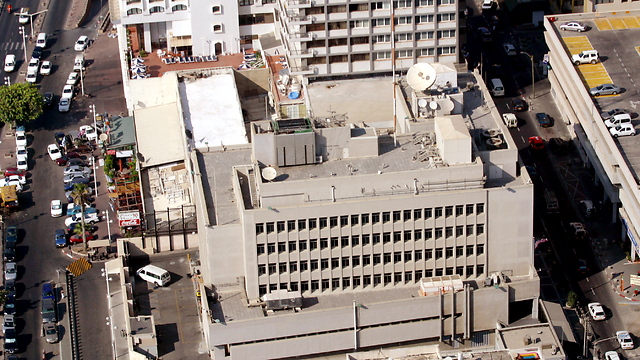
A forest of antennas and satellite dishes on the roof of the American Embassy in Tel Aviv (Photo: Meir Partush)
This area is built of an alloy of concrete, steel, and other materials that create a structure that is impenetrable to eavesdropping, even with lasers that can penetrate windows. With the computers and experts in the building, alongside their colleagues in Washington, Robert says, "we were able to infiltrate much of Israel's communication systems."
The Americans wanted, and still want, to know about Israeli plans - both military and diplomatic - that could change the face of the Middle East, and that Israel doesn't officially share with them. They also really want to know about the defense establishment's military and technological capabilities. They're not really interested in stealing sensitive technologies. They're more interested in the way such systems, or weapons with apocalyptic capabilities, might change the situation in the world. These things were particularly important during the Cold War, when any conflagration in the region could've led to a third world war.
So, for example, the US and Russia believed that Israel raised its level of nuclear readiness in the wake of Syria and Egypt's surprise attack in October 1973, which significantly increased the tensions between the two world powers. At a later stage of the Yom Kippur War, Israel believed the Russians had deployed nuclear missiles on the Nile Delta, and prepared to respond to that. This raised the tensions further, and put the United States at its highest level of nuclear readiness (other than during the Cuban missile crisis).
One of the central topics of interest for American intelligence throughout the years has been to know what is happening at the Dimona reactor. The late John Hadden, who served as the head of the CIA station in Israel in the 60s, revealed to me in an interview about a decade ago that he dedicated a considerable part of his time to trying to ascertain whether Israel was attempting to build a nuclear bomb.
He told me that Israel's Military Intelligence Maj.-Gen. Shlomo Gazit summoned him to rebuke him for the fact that he, Hadden, was spying on the State of Israel, telling him that he shouldn't think the Shin Bet hadn't noticed. "Our basic assumption was that in every movement we made outside the embassy building, your Shin Bet was sitting on our tails," Hadden told me. "They were very professional and took great pains not to be discovered."
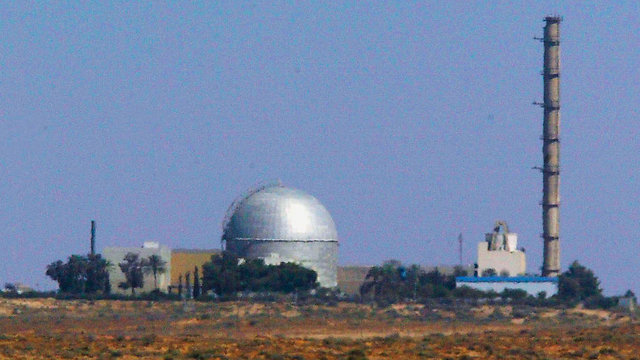
The Dimona reactor (Photo: Getty ImageBank)
Hadden's son, John Junior, is about to release his book "Conversations with a Masked Man" next month. In this book (and also in a conversation with Israeli nuclear researcher Prof. Avner Cohen), John Jr. tells of how his father used to take him and the rest of the family for a "picnic" in southern Israel, where they would collect dirt samples from different spots as part of a "game to get to know the area" that his father invented. Except that it was all a cover story: The samples were sent to the United States and analyzed by American nuclear experts. Hadden and his people were detained by the Israeli police several times over these spy games.
Israel was very sensitive about the Americans spying on Dimona. "We all were and still are convinced that the Liberty affair (on the third day of the Six-Day War, Israel sunk the Liberty, an American intelligence ship. 34 crew members were killed and 171 were wounded - RB) was not a mistake, but an intentional sinking meant to signal to the United States to stop spying on Israel," Robert claims.
Another point of interest for the US in the 70s and 80s was the special relations between Israel and South Africa. And, indeed, classified CIA documents accused Israel of conducting joint research with the apartheid regime on a series of weapons systems, advanced missiles of different kinds, and nuclear development.
But there was one incident that led to a dramatic increase in the amount of resources the US dedicates to spying on Israel. "The strike on the Iraqi reactor in 1981 - which we heard about only when Ambassador Sam Lewis was summoned to (Prime Minister Menachem) Begin's office, where he was told of the operation - was perceived as a grave failure of American intelligence," Robert says. "I even heard that there was a special team formed to investigate how it was possible that the Israeli Air Force, Military Intelligence, the Mossad, and a big part of the political system, are working on something of that magnitude, and we don't know anything about it and are caught so off-guard."
Following the attack on the reactor in Iraq, Robert says, the NSA launched intense efforts to infiltrate Israel's classified communication systems, "and primarily the Air Force's communications systems, which I believe were nicknamed 'Rigo' at the time, which were later adopted by the rest of the IDF." In fact, Robert is referring to the 'Trigo' communications system, which is a part of an advanced and encrypted communications apparatus that was developed by the Air Force after the 1967 Six-Day War. Later, these communications systems were adopted by the entire IDF and were nicknamed "Precious Stone," which is what many soldiers throughout the last decade called "The Red Phones," because the color of their receivers was red.
The mysterious agent 'Mega'
The United States first reaped the benefits of cracking those communication systems during the Israeli invasion of Lebanon in 1982. On June 17, some two weeks after the beginning of the war, the US strongly protested to Israel against IDF chief Rafael Eitan's order to bomb a certain area of Beirut. Since the bombing hadn't actually happened, the Israelis concluded that the Americans managed to intercept an encrypted "Red Phone" call between Eitan and the GOC Northern Command Amir Drori."The fact that they (the White House and State Department) decided at the time to take part of the information - we had much more than that - and share it with Israel, meaning endangering the secret that we know, shows how strained the relationship between the two sides was," Robert says.
It was clear to the NSA that Israel suspected some of the encryptions were cracked, but the Israelis, Robert says, kept talking freely. "All of these years you've been fighting enemies that were not good at developing advanced technological and SIGINT (Signal Intelligence) measures, and that's why you've become, in many ways, spoiled and complacent. Beyond that, you could've assumed, and rightly so, that the United States was a friend of Israel and would not make bad use of the information apart from instances in which it was against American interests. In the many meetings I had with Israeli intelligence officials, I was astonished many times when I got from them, during casual conversation, information that we made great efforts to obtain using exotic electronic measures."
Many of the documents in the ocean of files leaked by former NSA and CIA employee Edward Snowden, of which only a few were published, detail the deep cooperation between Unit 8200 and the NSA. In these periodic meetings, some of which Robert attended, the division of labor between the two intelligence agencies was discussed.
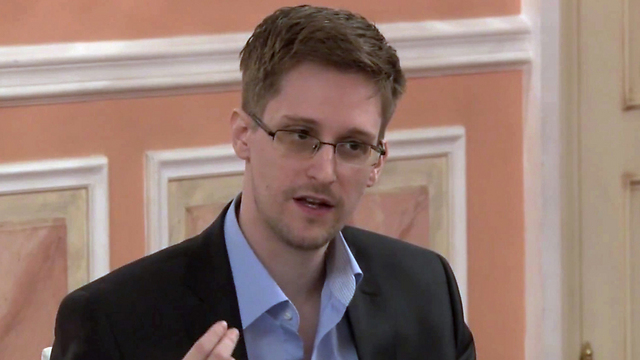
Former NSA and CIA employee Edward Snowden (Photo: AP)
As part of the cooperation between the two states, NSA satellite dishes were placed near Jerusalem, an area proven strategically important to catch broadcasts, in order to intercept communications from different places in the world and transfer them directly to the agency's headquarters in Maryland. The two agencies, according to the Wall Street Journal, have divided the Middle East and its main targets between them, and the information was being uploaded to a shared database.
On the other hand, American intelligence agencies were very much burned by the Pollard affair and invested a lot of effort into the search for any additional spies. These efforts mostly failed to lead to indictments (except for Larry Franklin, who was kicked out of his Pentagon job after it was claimed he leaked documents about Iran to AIPAC, although his sentence was eventually mitigated), but they led to a series of information leaks that could not have been obtained in any other way than by spying.
In May 1997, for example, the Washington Post made a lot of noise with a report of what at first appeared to be another Israeli spying affair. According to that report, the NSA picked up a phone call from the head of the Mossad's TEVEL division (responsible for maintaining ties with foreign intelligence agencies) in Washington to the Tel Aviv headquarters, in which he talks about using 'Mega' in order to obtain a letter from then-US Secretary of State Warren Christopher to Arafat. The Americans were furious. They thought 'Mega' was the code-name of a new agent that had infiltrated the US administration.
Except that the entire story was completely farfetched. The NSA translator simple misunderstood what Y., the head of the division, said - "Helga" and not "Mega." Helga is the Mossad's nickname for the CIA. Meaning, he was talking about an official request to American intelligence to receive the letter.
In another instance, a routine Shin Bet detail discovered communications made between a major in the IDF, who was serving in the Air Force, and one of the American Embassy's intelligence agents. That major, who was an agent for the Americans for several years, strayed from the communication guidelines he was given, and was caught. In this affair, to which there is more than meets the eye, the IDF officer was put on trial under a cloak of secrecy. He was sentenced to a long jail term, but was pardoned several years later and has been keeping a very low profile ever since.
Spying on the defense minister
"Desert Storm (the Gulf War) was a great opportunity for us to study the Israeli communication systems," Robert says with a smile. Israel, which at the time did not yet have reconnaissance satellites, needed the American satellites to receive warnings of Scud missiles being launched from Iraq.“Prime Minister Shamir reached an agreement with President (George H. W.) Bush to set up a direct line of data connecting our spy satellites' command and control center with the United States Embassy and with the subterranean IDF bunker. This communications system was indeed set up, but in the process of setting it up, and in the month it was active, we received important insights into Israel's command and control center in a way that would later help us to infiltrate them."
The September 11 attacks put the United States into war mode. On the instructions of Prime Minister Ariel Sharon, the American intelligence was given a series of processing and data mining systems developed by the Shin Bet, which even won The Israel Defense Prize, the highest decoration in the field. Thanks to these systems, which could place a very large amount of data gathered from different sources on one intelligence map, Israel's intelligence community was able to defeat an enemy considered unbeatable - suicide bombers. The Americans took these methods and developed them further with an investment of billions of dollars.
Michael Hayden, who was the head of the NSA and later the CIA in the last decade, in a conversation with me defined the cooperation between the US and some of its allies worldwide, including Israel: "Here is what we bring: We're big, we're rich, we're technologically advanced and we're global. What do our partners bring? They're small, focused and culturally and linguistically smart and relevant to the targets."
This cooperation allowed for advanced intelligence infiltration of common enemies like Iran and terror organizations, but it also led to serious disputes. Israel shared with the US the information it had on the Syrian reactor that was being built in Deir ez-Zor, but the prime minister at the time, Ehud Olmert, was not able to convince President George W. Bush to bomb the reactor.
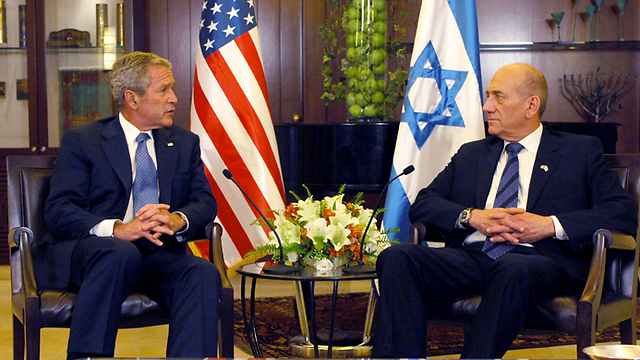
Then-prime minister Olmert, right, could not convince then-US president Bush to bomb the Syrian reactor (Photo: Avi Ohayon, GPO)
Israel tried to hide from the United States its decision to bomb the Syrian reactor, and extreme information security measures were taken, including barring the communication of critical information via electronic measures. Robert says these efforts were only partially successful.
"Before the attack, we saw a very significant spike in the activity of some intelligence and Air Force officials. Because of our past dialogue on the Syrian reactor, we assumed that was what this was about, but we didn't know about the exact date," he says.
Nonetheless, Robert says that the Americans did notice that the Israeli side was put on a high level of alert. There were internal reports in Israel that President Bashar Assad put his Scud C batteries on alert, and might have even armed them with chemical weapons.
The assassination of Syrian general Muhammad Suleiman in Tartus in August 2008, which was attributed by Syrian intelligence and some media reports to Israeli Naval commandos (Flotilla 13) and the Mossad, was also done under the watchful eye of the US. Robert reveals the American Navy’s intelligence unit and the NSA identified activity of the Israeli Navy and of "a special force of naval commandos" along the Syrian shoreline, and immediately connected this activity with the assassination and with information that came in at the same time from sources in Syria.
This comment by Robert is very significant, as it shows that even highly classified IDF tactical operations, if such an operation indeed occurred, are exposed to US intelligence.
But most of the American spying efforts against Israel over the past decade were focused on one thing: Iran.
Shortly after being appointed defense minister, Ehud Barak instructed the IDF to start seriously examining the possibility of attacking Iran's nuclear facility. At the same time, and not by coincidence, the Shin Bet discovered that the United States Embassy rented an apartment with a view of Barak's apartment at the Akirov Towers on Pinkas Street in Tel Aviv. The excuse for the renting that apartment was that it was for a Marine securing the embassy. But a Shin Bet detail that was stationed near the apartment noticed unusual electronic equipment being brought into that apartment.
The Israelis estimated that the apartment was fitted with highly advanced electronic equipment to eavesdrop on the defense minister's conversations, including a "laser microphone." This device shoots a laser beam towards an object in the room the person being spied on is in, normally a smooth surface like a framed picture or a window, and when the beam "bounces" back, it's affected by the sound vibrations caused to the object from the voice of that person. The device can catch the beam and "understand" in what way it was affected by the sound vibrations. A state-of-the-art computer converts these changes to audio.
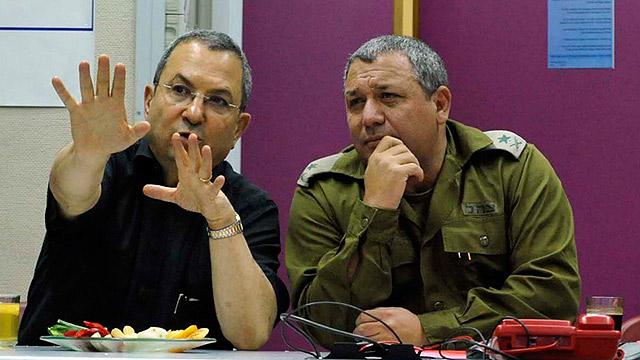
Then-defense minister Ehud Barak with then-Maj.-Gen. Gadi Eisenkot (Photo: Ariel Hermoni, Defense Ministry)
Barak used to hold meetings with different security officials in his apartment in the evening hours and during the weekends. The apartment had both regular phones and encrypted "red phones." The Shin Bet and the Information Security Department of IDF Intelligence took different measures to prevent eavesdropping on what was being said in the room, including closing the blinds every time there was a phone call or a meeting on security issues, as well as installing a system to disrupt the catching of the laser beam that bounces off the window.
"We were sure the Americans were listening and it became a routine practice at his home," says an intelligence official who used to come to the defense minister's apartment to brief him on classified information.
It would appear the Americans weren't able to get much from the laser microphone, but at the same time, and in light of the threat of an Israeli strike, they increased their spying efforts against Israel exponentially. A highly classified document Snowden took with him (parts of which were published by Der Spiegel correspondents Holger Stark and Marcel Rosenbach), includes a list of priorities for the NSA (NIFP) from 2010, meaning: The instructions the heads of the agency received from the American president on whom to spy on and on what topics to focus. Israel can be found high up on the list of spying targets, and in some of the categories it is no less important than states like Iran or North Korea.
The secret British base
The Snowden documents that were published reveal American spying of an incomprehensible amount of entities and institutions, including Israeli targets, by monitoring their e-mail accounts. This activity, which received the code names of Broadoak or Carboy, was mostly conducted at a secret eavesdropping based shared by the NSA and the GCHQ (the British version of the NSA) on the coast of the Atlantic ocean, some 300 km west of London. The documents show that the US spied on the e-mails of the Israeli Prime Minister's Office, the defense minister's office and several Israeli embassies across the world. As part of their cooperation, the two intelligence agencies - the American and the British - were able to hack into the international roaming system in order to intercept text messages and calls from smartphones that were outside their country of origin. Robert says that the NSA used this ability to monitor the phone conversations of Israeli officials in order to "try and understand whether Israel was about to unilaterally attack Iran's nuclear facilities."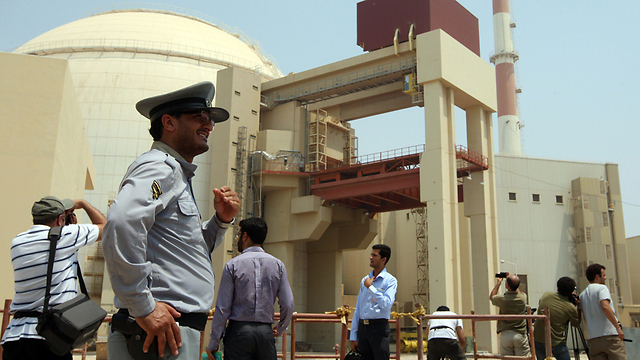
Iran's nuclear reactor in Bushehr (Photo: AFP)
Snowden's leaking of these documents caused great embarrassment to American intelligence and to the White House. President Obama announced that he will from now on limit the NSA's activity against American citizens and friendly heads of states. But the efforts against Israel were not limited – quite the opposite.
Most of the efforts, Robert says, were aimed at Netanyahu and his aides on one topic: "What do they know about the negotiations with Iran, and how do they intend to disrupt it, among other things through the (AIPAC) Israeli lobby's activity in the US and by approaching American officials," The Wall Street Journal reported that these activities reached a problematic point when conversations with American citizens were eavesdropped on (AIPAC officials, Congressmen, government officials) - a controversial issue in the US from a legal standpoint.
The White House, the WSJ's report stated, asked the NSA to pass on only what "you decide to deliver."
But even if not all of the material was passed on, Robert says, it doesn't matter. The problem was of a fundamental nature: "The order to use this kind of spying power against Israel, even after Snowden's leaks and the knowledge that continuing this kind of activity includes a significant political risk, illustrates just how the White House regards the Israeli government. This is not how you treat friends. This is how you spy against enemies."
Ronen Bergman
Source: http://www.ynetnews.com/articles/0,7340,L-4747949,00.html
Copyright - Original materials copyright (c) by the authors.
No comments:
Post a Comment